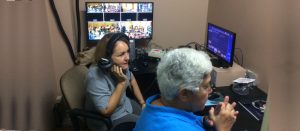 En su mensaje para la Jornada Mundial de las Comunicaciones Sociales 2021, el Papa Francisco nos dice que “Todos somos responsables de la comunicación que hacemos”.
En su mensaje para la Jornada Mundial de las Comunicaciones Sociales 2021, el Papa Francisco nos dice que “Todos somos responsables de la comunicación que hacemos”.
Con tantas nuevas herramientas digitales y dispositivos técnicos a nuestra disposición, cada uno de nosotros se ha convertido en editor, escritor, productor, fotógrafo…. podemos expresar nuestras emociones con gifs de tendencia y lindos emojis de caritas sonrientes. Podemos editar nuestras fotos y videos con aplicaciones en línea. Podemos convertirnos en expertos en cualquier tema si lo buscamos en Google. Todos podemos ser periodistas de medios simplemente presionando el botón de grabación en nuestros teléfonos inteligentes. Pero, como sugiere el Papa Francisco, esto conlleva una gran responsabilidad. Una vez publicado, no hay vuelta atrás. Si pertenecemos a un periódico o una red de televisión de buena reputación, es necesario valorar y revisar los estándares adecuados y principios éticos. Pero para nosotros, el promedio de aspirantes a periodistas aficionados, es libre para todos y los efectos y repercusiones de nuestras acciones a menudo simplemente se pasan por alto. Las redes sociales están abiertas a lo bueno, lo malo y lo feo.
El mensaje del Papa Francisco afirma que somos responsables “de la información que compartimos”. Podemos ver y experimentar muchas cosas en la vida, pero la pregunta es, ¿deberíamos compartirlo … porque sabes cómo a la gente le encanta reenviar cosas! Pero una vez que lo compartes, es de dominio público. La conclusión es, ¿qué impacto tendrá? ¿Será positivo o negativo? ¿Cuántas veces te has sentido avergonzado porque compartiste una historia que resultó ser una noticia falsa? Nos pasa a los mejores. Entonces, ¿no sería mucho más seguro si solo compartiéramos lo que realmente “vemos” y hemos presenciado o experimentado por nosotros mismos? Como dice el Papa Francisco, “Todos debemos ser testigos de la verdad: ir, ver y compartir”.
Para nosotros que estamos involucrados en las comunicaciones católicas, este llamado “para ir” es una tarea difícil con las limitaciones de la pandemia, pero la tecnología nos permite conectarnos fácilmente con otros incluso si no podemos ir físicamente. Podemos pedirle a la gente que grabe sus historias en sus teléfonos y podemos recopilarlas y difundirlas. Podemos “ver” fácilmente el espacio de otra persona y escuchar sus situaciones, pero la clave es hacer las preguntas correctas.
Nuestro papel como comunicadores católicos es ser testigos de la verdad utilizando nuestras plataformas de medios para dar voz a aquellos que de otro modo no serían escuchados, pero también para contar milagros positivos cotidianos que experimentamos para que “el Evangelio cobre vida en nuestros días” y a través de nosotros damos vida y esperanza a los demás.
* Presidenta de SIGNIS Caribe
Traducción libre de SIGNIS ALC
Revise aquí la versión original en inglés
“All of us are responsible for the communications we make.
Message from SIGNIS Caribbean president (Lisa Bhajan) for the World Communications Day 2021
In his World Communication Day Message, Pope Francis tells us that, “All of us are responsible for the communications we make.”
With so many new digital tools and technical devices at our disposal, each of us has become a publisher, a writer, a producer, a photographer…. we can express our emotions with trending gifs and cute smiley-face emojis. We can edit our pics and videos with online Apps. We can become experts on any topic by researching it on Google. We can all be media journalists by simply pressing the record button on our smartphones. But, as Pope Francis suggests, this comes with great responsibility. Once it’s posted there’s no turning back. If we belong to a reputable newspaper or TV network, there are checks and balances in place for proper ethics and standards. But for us, the average amateur wanna-be journalists, its a free-for-all and the effects and repercussions of our actions are often simply overlooked. Social media is open to the good, the bad and the ugly.
Pope Francis’s message claims that we are responsible “for the information we share.” We can see and experience many things in life, but the question is, should we share it…because you know how people just love to forward things! But once you share it, it’s in the public domain. The bottom line is, what impact will it have? Will it be positive or negative? How many times have you been embarrassed because you shared a story that turned out to be fake news? It happens to the best of us. So wouldn’t it be a lot safer if we only share what we actually “see” and have witnessed or experienced for ourselves? As Pope Francis says, “All of us are to be witnesses of the truth: to go, to see and to share.”
For us who are involved in Catholic communications, this call “to go” is a difficult task with the limitations of the pandemic but technology allows us to easily connect with others even if we cannot physically go. We can ask people to record their stories on their phones and we can compile them and broadcast them. We can easily ‘see’ another person’s space and hear their situations but the key is to ask the right questions.
Our role as Catholic communicators is to be witnesses of the truth using our media platforms to give a voice to those who may otherwise not be heard but also to tell positive everyday miracles that we experience so that “the Gospel comes alive in our own day” and through us we bring life and hope to others.









